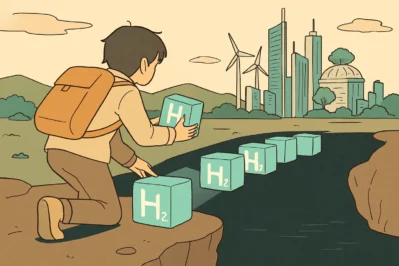Powering Up Korea: Talk Hydrogen Energy Like a Pro!
Hello! Welcome to Maeil Hangul (Daily Korean), your go-to spot for upgrading your Korean language skills!
Today, we’re diving into a topic that’s buzzing in tech and policy circles: the science of climate change, specifically focusing on the potential and challenges of hydrogen energy. These are the kind of advanced terms you’ll need for professional meetings, academic discussions, or simply to understand the news like a native speaker.
Lately in Korea, the push for 탄소 중립 (tanso jungnip), or carbon neutrality, is a massive national project. As a global leader in technology, Korea is investing heavily in green energy, and hydrogen is constantly in the headlines. So, let’s get you ready to join this high-level conversation!
Core Expressions You Need to Know
Here are some key terms to help you discuss the future of energy in Korean.
1. 잠재력 (jam-jae-ryeok)
- Pronunciation [Romanized]: jam-jae-ryeok
- English Meaning: Potential; latent energy
- Detailed Explanation: This is a Sino-Korean word (잠재(潛在) + 력(力)) that literally means “hidden power.” It’s a formal and versatile noun used in business, science, and economics to talk about the undeveloped capabilities of a person, technology, or market. It’s the perfect word to describe the promise of a new energy source.
2. 상용화 (sang-yong-hwa)
- Pronunciation [Romanized]: sang-yong-hwa
- English Meaning: Commercialization; practical application
- Detailed Explanation: This noun refers to the process of making a new product, service, or technology available on the mass market. It’s a crucial term in any discussion about innovation. When you hear that something is in the process of 상용화, it means it’s moving from the research lab to the real world.
3. 친환경 (chin-hwan-gyeong)
- Pronunciation [Romanized]: chin-hwan-gyeong
- English Meaning: Eco-friendly; environmentally friendly
- Detailed Explanation: A combination of 친 (chin), meaning “pro-” or “friendly,” and 환경 (hwan-gyeong), meaning “environment.” This is the go-to adjective for anything related to green technology, sustainable living, or environmental protection. You’ll see it everywhere, from coffee cups to government policies.
4. 극복해야 할 과제 (geuk-bok-hae-ya hal gwa-je)
- Pronunciation [Romanized]: geuk-bok-hae-ya hal gwa-je
- English Meaning: A challenge/task to be overcome
- Detailed Explanation: This is a more advanced phrase. 극복하다 (geuk-bok-ha-da) means “to overcome,” and 과제 (gwa-je) means “task” or “challenge.” The grammar
~해야 하다means “must do.” So, the entire phrase describes a necessary hurdle or obstacle that must be cleared to achieve a goal. It conveys a sense of difficulty and importance, making it perfect for formal reports and discussions.
Example Dialogue
Let’s see how these expressions work in a real conversation between two colleagues, Min-jun and Ji-hye.
A (Min-jun): 지혜 씨, 수소 에너지 기술에 대한 뉴스 기사 읽어봤어요? 정부 투자가 엄청나더라고요.
(Ji-hye, have you read the news article about hydrogen energy technology? The government investment is huge.)
B (Ji-hye): 네, 봤어요. 수소 에너지의 잠재력은 정말 크죠. 하지만 아직 상용화까지는 극복해야 할 과제가 많아 보여요.
(Yes, I saw it. The potential of hydrogen energy is truly great. But it seems there are still many challenges to overcome before commercialization.)
A (Min-jun): 맞아요. 특히 생산 비용이랑 인프라 구축 문제가 있죠. 그래도 성공만 한다면 진정한 친환경 사회로 가는 큰 걸음이 될 거예요.
(That’s right. Especially the issues with production costs and building infrastructure. Still, if it succeeds, it will be a big step towards a truly eco-friendly society.)
B (Ji-hye): 저도 동의해요. 기술 발전이 순조롭게 이루어지길 기대하고 있어요.
(I agree. I’m looking forward to seeing the technological development proceed smoothly.)
Culture Tip & Trend Deep Dive
In Korea, hydrogen energy isn’t just an abstract scientific concept; it’s a tangible part of the national “Hydrogen Economy Roadmap.” The government and major corporations like Hyundai and SK are all-in.
You’ve probably seen a Hyundai NEXO on the road in Seoul. This is one of the world’s leading hydrogen fuel cell vehicles! This car is a perfect real-life example of 수소 에너지의 상용화 (the commercialization of hydrogen energy).
When you discuss this topic, mentioning specific Korean policies or corporate efforts will make you sound incredibly knowledgeable. For instance, you could say: “한국은 수소 경제를 선도하려는 의지가 강해서, 기술적 과제들을 빠르게 극복할 것 같아요.” (Korea has a strong will to lead the hydrogen economy, so it seems likely they will quickly overcome the technical challenges.) This shows you not only know the vocabulary but also the context behind it!
Let’s Recap & Practice!
Great job! Today we learned four key expressions to discuss the advanced topic of hydrogen energy: 잠재력 (potential), 상용화 (commercialization), 친환경 (eco-friendly), and 극복해야 할 과제 (a challenge to overcome).
Now, it’s your turn to practice! Fill in the blanks below with the appropriate expression from today’s lesson.
- 이 신기술은 ________은 높이 평가받고 있지만, 아직 해결해야 할 기술적 문제가 많다.
(This new technology’s ________ is highly regarded, but there are still many technical problems to solve.) -
정부는 ________ 자동차 보급을 확대하기 위해 보조금을 지급하고 있다.
(The government is providing subsidies to expand the supply of ________ cars.)
Ready to show off your new skills? Try creating your own sentence using one of today’s expressions and share it in the comments below! We’d love to see it!






